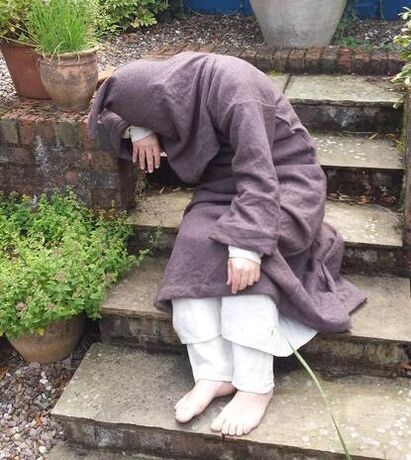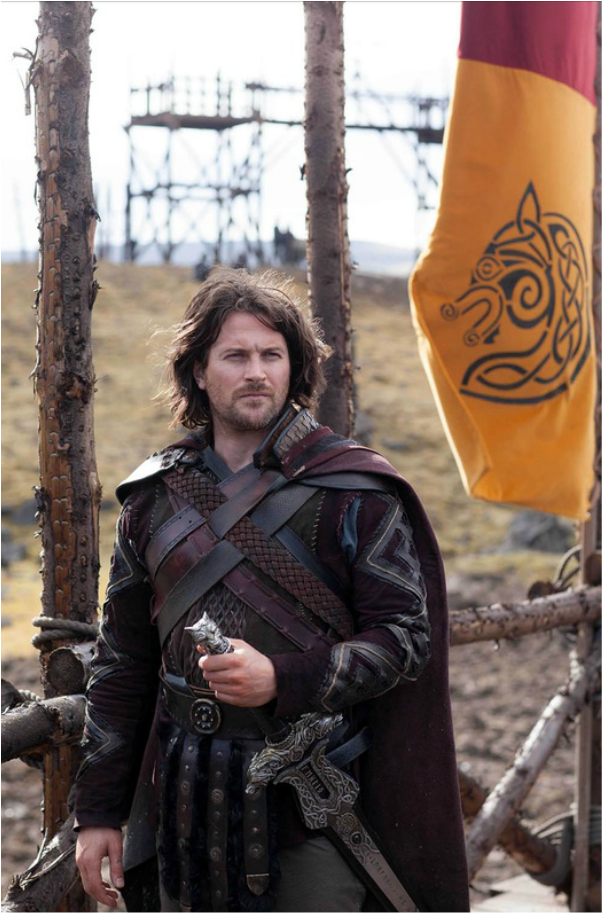|
The Anglo-Saxon Monk is disgruntled over the depiction of thegns in the new British adaptation of the epic Beowulf. Blessed readers, No one, I assure you, has ever charged me with the iniquitous sin of immoderate fantasizing. (The odd bout of prurient daydreaming during my childhood Latin lessons doesn’t count.) This monastic capacity to withhold oneself from the greater excesses of mental wandering does not mean, however, that I am devoid of imagination. Let me make it abundantly clear, beloved ones, that we Anglo-Saxon monks love a bit of mental playfulness, as any reader of the Anglo-Saxon riddles will attest (though please don’t read the rude ones.) So this brings me to the matter at hand, one of very great concern to many of you as twenty-first-century consumers of ‘medieval fantasy’. In case you haven’t noticed, Beowulf is back! Well, at least in the land of my origins; inhabitants of USA will have to wait until January 23rd. Yes, you can sit down on a Sunday evening (I’m between prayers, so it’s allowed) and avail yourself of Beowulf: Return to the Shieldlands. That’s Beowulf, the greatest piece of early medieval literature – without exception – revisited, retold, and, as the official ITV press release informs us, re-imagined. Now, beloved, that’s allowed. It’s fine, as far as I’m concerned, to take core elements from my favourite epic and create a new story for the scops to sing. Admittedly, in this case, the creative use of those core elements amounts to little more than the redeployment of three names: Beowulf (our beloved superhero), Hrothgar (the aging king) and Heorot (the name of Hrothgar’s hall). But I can cope with that; I don’t necessarily need a narrative which actually resembles that of the original poem in order to be entertained. You may, however, feel deceived by this treatment of our Old English masterpiece, but not me. You may rail against its apparent indifference to the real Beowulf, but, blessed readers, this is the world of medieval fantasy drama; or, as described by ITV in its original press release, this is actually ‘a Western set in the Dark Ages of Britain’s mythic past’. So we were warned – though I have no idea what a Western is. Yet even as I defend the right to completely hijack the name Beowulf for the sake of creative imagination, I still find myself annoyed. Why? Well, we all have our limits, don’t we? And for me, blessed readers, it’s the fact that the wizard-like devisers of this Beowulf don’t seem to know what a thegn is (you may be more familiar with ‘thane’). Now, beloved, I really can suffer, with little unbalancing of my emotional or spiritual equanimity, the copious amounts of anachronism shovelled forth in much medieval fantasy that comes our way, but please, please get the representation of one of the primary figures of early medieval societies right! Please! So what is a thegn? Since Beowulf is an Anglo-Saxon poem, I will primarily deal here with Anglo-Saxon definitions, but I will also dwell a little on the Viking thegn, since the world of Beowulf in the original poem is set in Scandinavia. So, blessed children, here is my list of nine things about thegns that I know you will be dying to know (ten things would be so yesterday, beloved), along with my occasional expressions of disapprobation at how thegns are depicted in Beowulf: Return to the Shieldlands: 1. Thegn in Old English (OE) is þegn, literally meaning ‘one who serves’. From þegn, we derive the OE verb þegnian, which means ‘to serve a person’. The cognate noun in Old Norse is spelled the same.
2. Thegns are male. Do you hear ITV wizards? Male. Alas, if only they had consulted me beforehand (my prices are very reasonable), then I’m quite sure they would not have created ‘Thane’ Rheda, the widow of Hrothgar, who is also labelled ‘Thane’ – which brings me to: 3. A thegn serves his lord, very often a king. By contrast, in Return to the Shieldlands, ‘Thane’ Hrothgar is himself, to all intents and purposes, the king – just look at his big, big, big fancy hall. And his wife and successor, ‘Thane’ Rheda, is essentially his queen. But they insist on calling them thanes. Perhaps here, more than anywhere, the tale-tellers should have stuck to the original poem, which of course has Hrothgar as the king in Heorot and his wife, Wealtheow, as his queen. (By the way, was Wealtheow seen as too difficult to pronounce?) Those of you who know the poem well will remember that when Grendel, the monster, first strikes Heorot, he seizes ‘thirty thegns from their rest’ (OE þritig þegna, line 123a) and slaughters them. Subsequently, Hrothgar grieves for these thegns – his thegns – suffers ‘thegn-sorrow’ (OE þegnsorge, line 131b). Clearly, Hrothgar has thanes; he isn’t one himself. 4. Thegns are principally warriors. Even though, as the centuries passed, the meaning of thegn began to shift somewhat, the military aspect remained constant. In Old English poetry, thegn is used as a synonym of 'warrior' or 'hero'. It’s used in Beowulf interchangeably with words meaning ‘champion’, ‘hero’, ‘warrior’, thus creating poetic variation, something all good scops (singing poets) know how to do. In the ITV adaptation, Rheda states that she could never be a warrior. And so, notwithstanding the concept of the Viking shieldmaiden, Rheda could therefore never be a thegn. 5. During the Viking Age, a þegn may not only have been a warrior, or champion, but also a goði, one who cares for the cult of specific gods, as well as acting as a lawman and a leader in battle and trade (Sundqvist, p. 224). In the new adaptation, one of the fellows in Hrothgar’s hall seems to hold rather mystical powers; perhaps he’s meant to be a goði-thegn. 6. In Anglo-Saxon England, thegns as a class were very powerful. I could explain this by regaling you with stories from my own life here in the late Anglo-Saxon period, but I will defer to a renowned scholar from your world, Simon Keynes, who explains: ‘Collectively, the thegns were the very fabric of social and political order: they were the ones with the local power and influence [...]; it was the king’s ability (or otherwise) to command their support which determined his ability (or otherwise) to pursue a particular course of action.’ (Keynes, p. 443.) I think the power of thegns does come across in our new Beowulf – the first episode draws our attention to an important council of thanes – but nevertheless the confusion created over Hrothgar’s status leaves me grumbling into my ale (which I’m allowed to drink, by the way – in moderation, of course.) 7. In Scandinavia, the word þegn often finds its way into place names, for example, in Tegneby and Tegnaby (both in Sweden). This probably indicates that during the Viking period warriors were placed there. We might describe this as the trace of political power in the early medieval landscape (Brink, p. 62.) 8. In the original Beowulf, thegns not only fulfil their warrior duties but also carry out other significant roles, sometimes ceremonial, in order to forge feelings of community, loyalty and joy. For example, after Beowulf arrives at Heorot, one of Hrothgar’s thegns ‘did his duty’ by making Beowulf and his men feel welcome, taking to them a decorated communal ale-cup and serving them with its sweet drink (lines 494b-496a; see Swanton, p. 56-7). Similarly, after Beowulf defeats Grendel, ‘a thegn of the king’ (OE ‘cyninges þegn’, line 867b) takes up the role of scop, a singing poet, and skilfully improvises a new poem to tell of Beowulf’s exploits. Ah, I can see myself there right now! 9. By the time of Alfred the Great (king of Wessex, 871-899), there was a good deal of organization among the thegns of the royal court. For example, from the witness-lists in royal charters we learn of the discþegn (literally ‘dish-thegn’), who was a steward responsible for domestic affairs of the royal household, not someone who did the washing-up; and the hræglþegn (literally ‘clothing-thegn’), who, though it sounds from his title that he oversaw the royal wardrobe, was probably equivalent to the burþegn or ‘chamber-thegn’, who held the king’s purse, and is also attested to in charters. (See Keynes, p. 444; Palgrave, pp. 347-8.) So there you have it, beloved. Now please try to refrain from booing or shouting at your television screens, or other wondrous and wizard-spun devices, every time ‘Thane’ Hrothgar or ‘Thane’ Rheda appear. It would be most un-Christian of you. Instead, please feel free to have a grumble below in the comments section – or indeed tell me of your delights and joys at seeing Beowulf come to life in this new mixing of words and images – only don’t get too carried away. Everything in moderation. Bibliography Brink, Stefan. 'Naming the land', in The Viking World, ed. Stefan Brink and Neil Price (Routledge, 2008), pp. 57-66. Keynes, Simon. 'Thegn', The Blackwell Encyclopaedia of Anglo-Saxon England, ed. Michael Lapidge et al (Blackwell Publishing, 1999), pp. 443-4. Palgrave, Francis. The Rise and Progress of the English Commonwealth: Anglo-Saxon Period (John Murray, 1832). Sundqvist, Olaf. 'Cult leaders, rulers and religion', in The Viking World, ed. Stefan Brink and Neil Price (Routledge, 2008), pp. 223-6. Swanton, Michael, ed. and trans., Beowulf : Revised edition (Manchester University Press, 1997).
19 Comments
16/1/2016 09:23:53 pm
Such a pleasure, as always, to read your commentary, brother. As I do not dwell in England's green and pleasant land, I have not yet seen this version of BEOWULF so I cannot speak to its quality myself. (I must, however, confess to finding the image you've posted above of our new hero quite enchanting.) I am rather giddy at all the attention that the Anglo-Saxons are receiving in the media just now and pray that it continues although, like you, I find myself grumbling when they make a hash of things. I sincerely hope that you will continue to chronicle your thoughts about BEOWULF. (The Regia Anglorum set appear to be beside themselves about it, which does not bode well, alas!)
Reply
The Anglo-Saxon Monk, aka Christopher Monk
16/1/2016 09:40:59 pm
I am much obliged for you kind words, Lady Bracewell. However, I also feel obliged, in view of your expessed sentiments, to counsel you against excessive giddiness especially in relation to the male form, though I quite understand your frailty in this matter. May you be blessed.
Reply
Carol W
16/1/2016 10:05:31 pm
My heart bleeds for "Academic Advisors" I've seen Twitterarti exchanges where the best circumspect interventions or suggestions appear to have been ruthlessly quashed by "perpetrators" in pursuit of audience ratings - I suspect what we have of "Beowulf" may be just one version of re-imagining ...
Reply
Christopher Monk
17/1/2016 09:24:43 am
Thanks, Carol; it's always good to hear your perspective. It's important, as you know, to engage people, and sometimes that means, in the first instance, a kind of compromise -- or rather some creative thinking.
Reply
Christopher Monk
17/1/2016 09:28:39 am
Btw, I've just started writing out an initial plan for my own Beowulf adaptation. It will preserve the original tale but will go back into the past, focusing more on the origins of the Grendelkin. So stay tuned.
Reply
17/1/2016 03:52:06 pm
Will look forward to YOUR adaptation, Chris, and to more comments by the Anglo-Saxon Monk, who is always entertaining and enlightening.
Anna
17/1/2016 12:35:35 pm
Carol
Reply
Christopher Monk *The Anglo-Saxon Monk
18/1/2016 04:07:00 am
Thanks Anna for your thoughts. Much appreciated. I think the difficult thing with Beowulf is that it isn't history as such in the first place. This seems to be an excuse for some to take enormous liberties with the text. This new "adaptation" is laughable in its attempt to disguise itself as something inspired by the original story, laughable because no one who has read Beowulf is fooled. It bears no resemblance whatsoever to the original. I wish they hadn't hijaked the name Beowulf but rather simply put it out there more honestly as a piece of medieval fantasy drama, which is what it is.
Päivi Loukamo
19/1/2016 04:47:42 pm
Haa, such a pleasure to read your comments, especially yours, Anna.
Reply
Jeff
13/5/2017 02:53:02 am
Wonderful, wonderful commentary.
Reply
Christopher Monk
13/5/2017 05:24:30 am
Thank you, Jeff!
Reply
5/6/2017 07:41:54 pm
Thank you for your kind words. Very much appreciated.
Reply
3/9/2018 02:49:55 am
We have a good track record in the ranking of permanent and permanent sites.
Reply
7/9/2018 12:32:30 am
Content Marketing Integration into our special social media backend management platform.
Reply
18/9/2018 03:21:07 am
There is important techniques to do before you explore it.
Reply
Your comment will be posted after it is approved.
Leave a Reply. |
Details
|



